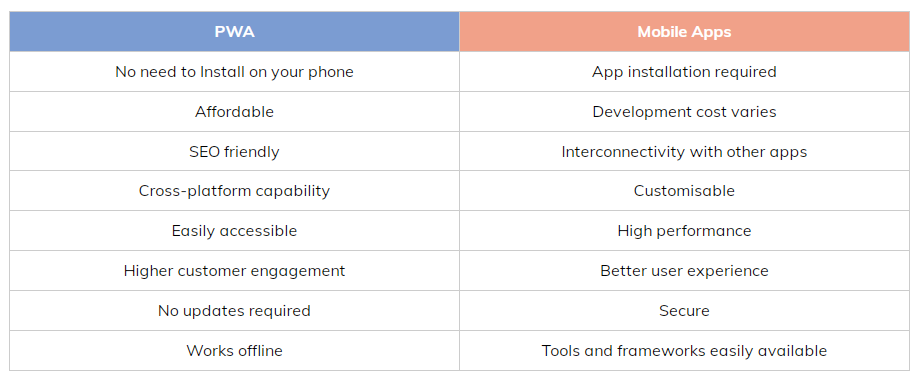A mobile application or an app is a software application designed to run on a mobile device such as a phone, tablet, or watch.
Progressive Web Apps (PWAs) are web apps that use service workers, manifests, and other web-platform features in combination with progressive enhancement to give users an experience on par with native apps.
PWAs provide a number of advantages to users — including being installable, progressively enhanced, responsively designed, re-engageable, linkable, discoverable, network independent, and secure.
Progressive Web Applications (PWA). They are built using modern JavaScript frameworks and are designed to work just like a native mobile app. These are apps that can be downloaded directly from the browser. They have both app-like and website-like advantages. Also, they provide a much more convenient experience for users.

It allows developers to provide features like:
It allows adding an application icon to the mobile home screen as a shortcut.
It allows access to application data even when you are offline.
It allows background synchronization.
It allows access to the camera.
It allows receiving push notifications for the app.
Progressive Web Applications (PWAs) is an approach to developing web applications that give traditional web apps the look and feel of native apps. With a progressive web app, developers can improve the legacy web application with all the ingredients and features of the mobile app. It increases usability and extends a great user experience (UX). Developing applications in a progressive manner deliver an app-like experience with modern web capabilities.
PWA enables web apps to be stored on your device. It produces an icon in the form of a website app. Opening that icon will show the look and feel of the mobile application. With PWA, all previously opened posts are stored on the device. Users do not need to access the Internet to read them a second time. PWA app development uses a methodology combining the native app experience rendering web browser features.
Characteristics of Progressive Web Applications (PWA's)
Progressive web apps are web applications that are designed to be capable, reliable, and installable across a variety of devices and platforms. This new form of application development complements the improved user experience and look that makes the app feel similar to a platform-specific app.
Here are the five characteristics every progressive web application delivers.
Progressive: The word progressive has a specific meaning in PWA applications. It means the application should work on any device or platform, providing superior appearance and performance on both users' mobile browsers and PCs.
Discoverable: Progressive web apps are websites or web applications that have additional features and functionalities. Users can search these apps through search engine applications. Companies are not required to upload these to the App Store or Play Store.
Responsive: The term responsive in web apps means that the app can fit any device or screen size. Progressive web apps are responsive, which means they can fit themselves into any form, factor, and screen size within a device.
App-like: Progressive web apps render the look and feel of native applications. Even though the approaches used to create, share, launch, and update PWAs are fundamentally different from native applications, they provide similar features that native web apps offer.
Connectivity and Independence: PWA works seamlessly even when connected to low internet speed.
Advantages of PWA
PWA-based web apps look very impressive on smartphones and other portable devices.
Users can easily save a portion of these apps on their devices.
Progressive web apps do not require any updates.
It becomes easy to load PWA apps on the smartphone.
Such applications save money and time as developers do not need to create separate apps for Android, iOS, and other platforms.
With PWA, all previously opened posts are stored on the device. Users do not need to access the Internet to read them a second time.
It requires lesser internet data to load its components.
Developing PWA apps are cheaper than the other native applications.
